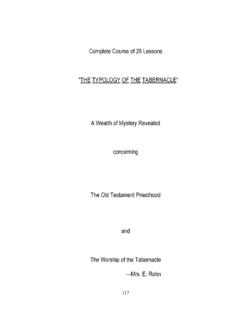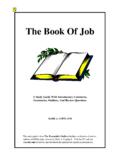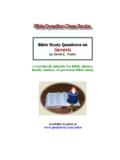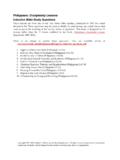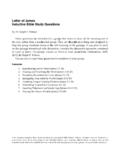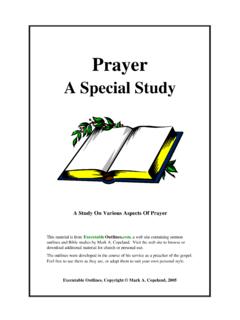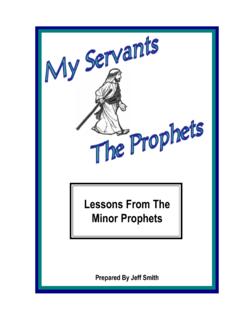Transcription of PENTECOSTAL BIBLE STUDY COURSE - Yola
1 1 PENTECOSTAL BIBLE STUDY COURSE (250 Lessons with Questions and Index) VOLUME ONE Methods of BIBLE STUDY Important BIBLE Doctrines Personal Evangelism The Complete Books of GENESIS, EXODUS, ESTHER, RUTH AND HOSEA INCLUDING A 26 lesson COURSE : THE TABERNACLE IN THE WILDERNESS!? -by Mrs. E Rohn CHURCH HISTORY COURSE (37 lessons) -by Myrl Nutting Copyright E Rohn 1966 PENTECOSTAL PUBLISHING HOUSE 8855 Dunn Road Hazelwood, Missouri 63O42 2 3 lesson No 1 INTRODUCTION: THE WORD OF GOD I. Purpose of the Word of God. 1 To show the way of life "These things have I written unto you that ye may know that ye have eternal life." I John 5:13. The scriptures furnish the only source of such knowledge! 2 To show Christ's divinity. John 20:31: "But these are written that ye might believe that Jesus is the Christ, the Son of God; and that believing ye might have life through his name.
2 " 3 As an example(l) of good to follow, and (2) of evil to shun Christ is the perfect example I Pet 2:21 John 13:15 Paul tells us we can profit by the warnings of the Word. I Cor. 10:5-11. 4 As daily food for the soul. Isa. 55:10-11. As the body lives by natural food, so soul thrives on the Word of God. Deut. 8:3, Job 23:12; Jer. 15:16; I Pet. 2:2. Note: Our chief objective in BIBLE STUDY is not merely to learn a lot of things about Christ, but to become acquainted with Christ Himself. In John l:14 we see that "the word was made flesh and dwelt among us." In other words, Christ is the living Word. No one can truly say that he knows the Word, without being acquainted with the Christ who inspired its writings. Knowing Christ makes the BIBLE a new book to its readers. A story is told of a woman who was given a copy of a certain book, but finding the book very uninteresting took it to the attic where it was left for a number of months.
3 One day she was introduced to a well-known author, and became quite well acquainted. Later on this man inquired as to whether she had read a certain book he had written. Recognizing the name of the book as the one she had carried to the attic, she went home, took the book from its hiding place, and this time she found the book to be one of the most fascinating she had ever read. What made the difference? She had become acquainted with the author! II. Methods of BIBLE STUDY . 1. As an inspiration for worship. As we read the songs of praise and the prayers of those whose hearts reached out after God, we are inspired to worship, and to seek God for the blessings they enjoyed. 2. The biography method. The STUDY of the lives of great BIBLE character will-prove interesting to any who choose this method. Notice what preparation they made for the service they rendered., how they over-came the handicaps in their way, and also the mistakes which we can avoid.
4 3. By chapters or books. In studying a book, it is necessary to note (1) its author, (2) to conditions which made the writing of the book necessary, (3) to whom it is written, and (4) the chief subjects covered, "In studying some books it is well to give each chapter names, suggestive of the contents. Practice thinking through an entire book consecutively by chapter names." Saxe. 4. The subject method, such as is found in Volume two in this COURSE . III. Importance of Memory Work. 1. When studying by chapters, memorize the outstanding verse. 2. When studying subjects, it is best to memorize several scriptures which link together in a comprehensive manner. Also the Holy Spirit is invaluable in "bringing all things to our remembrance." 4 lesson 2 RULES FOR STUDY I When studying by books 1 First note the purpose and the general divisions of the book before attempting to take up the details.
5 Someone has said it is well to use the telescope first, and the microscope afterwards. The details will have more meaning as they are related to the whole. 2. Read the book carefully before considering comments on the same. A matter of first importance in studying the scripture is to become familiar with the material. It will not be so difficult to find what the BIBLE means if you are first careful to note exactly what it says. 3. Maps will prove to be of benefit. Locate the main events studied, geographically on the map. II. Remember that the Word is divinely inspired. II Pet. 1:21. 1. The Spirit and the Word agree, for the Word is a product of the Spirit of God. Ezek 1:3: "The word of the Lord came to Ezekiel, and the hand of the Lord was there upon him." See also II Tim. 3:16 and Acts 1:16. In Rev. 14:13, John "heard a voice from heaven, saying unto him, Write.
6 " 2. Since God1s Word is inspired, yes, is the very Spirit of God talking to our hearts, another important rule is: Accept no so-called "revelation" which is out of harmony with the Word of God. 3 Since God's Word is inspired, it does not need to be "defended This principle will help workers to give out the Word, but not to merely argue the Word You do not need to defend the Word any more than you would have to defend a lion-just turn it loose and it will defend itself! 4. We cannot say that the words written in italics are inspired, for they did not appear in the original These words are put in a different kind of print from the main context, to show that they were added by the translators to make the meaning more clear. A good rule to follow concerning words in italics is: If the added word does not change the meaning of the verse, accept it, but if the word or words added change the meaning, leave them out.
7 In other words, any verse should mean the same, with or without the words in italics. III. Figurative language Never take a scripture to be figurative language unless the BIBLE furnishes you with the key to the figure. For instance, in I Pet. 3:20-21, Peter is talking about the Ark whereby eight souls were saved by water. Then in the next verse we are given the key to a spiritual application, when he says, "The like figure whereunto even baptism doth also now save us." Another clear example is found in Gal. 4:23-24. Here Paul is writing concerning the bond woman and the free woman. He plainly says: "Which things are an a11egory, for these are the two covenants." Many have found some things which illustrate a spiritual truth, and because they did not observe this rule of BIBLE STUDY , they went to the extreme and began to spiritualize every BIBLE truth, drop-ping even the literal significance.
8 Through this error some have done away with the Lord's supper, with water baptism, and have ceased to believe that Jesus is literally coming in the clouds of glory! 5 IV. Our attitude toward new truth. 1. No matter how much we may have 1earned of the Word of God, we should maintain a teachable spirit. To set one's mind against every-thing that is new is to miss many things that would have blessed the people to whom you minister. The more one studies the Word of God, the more he sees there is to learn! 2. On the other hand, we are given the warning by Paul in Heb. 13:9 "not to be carried about with divers and strange doctrines." Additional truth will never nullify truths already revealed. A genuine love for the truth is the greatest stabilizing force in the wor1d. If a man loves anything more than the truth (his own way, great personalities, manifestations or miracles) he may receive a strong delusion, and be lost in the end.
9 V. Ways of testing the truth. 1. Does it glorify Christ? You will find the more truth you gain, the bigger Jesus you will have on your hands 2. Does it make us more like the pattern of the early Church as written in the Acts of the Apostles? Paul warns in Gal. 1:8, and 10-11 that though he or an angel from heaven preach any other gospel than that of the Apostles, "let him be accursed." In Heb. 8:5 the church is exhorted as was Moses: "See, saith he that thou maketh all things according to the pattern." And in Jude 3, we are told to earnestly contend for the faith that was once delivered unto the saints." 3. Do all scriptures harmonize on the subject? In I Thess. 5:21 we are told to "Prove all things and hold fast that which is good. I? We cannot say that we have thoroughly proven any subject, or are grounded on the truth, until we can harmonize all the scriptures.
10 For instance, one could not say that he had the truth on baptism in the name of Jesus, who would purposely dodge Matt. 28:19. To those who have the truth on this subject, Matt. 28:19 is one of the strongest scriptures that can be used to teach water baptism in the name of Jesus. 4. Does it tend to make us live more holy lives? The real truth of God will tend to promote holiness in the lives of those who will take heed thereto. For instance, the truth of the second coming of Christ promotes holiness, for it is a "purifying hope." I John 3:2-3. As a contrast to this, some teachings tend to cause those who have accepted them to become lukewarm. False doctrine is a great weapon in the hands of Satan in making foolish virgins. As one ex-ample, if we believe that being once saved, we shall always be saved, and that it is impossible to fall from grace, the enemy of our souls has an added weapon to use against us in trying to make our lives careless and unfruitful.
